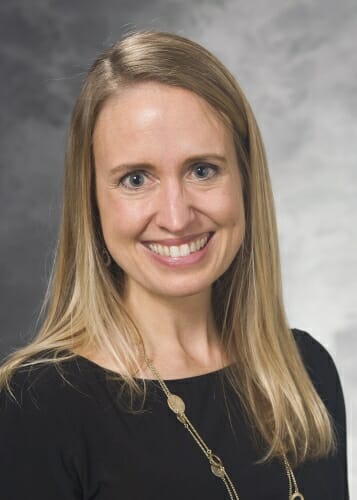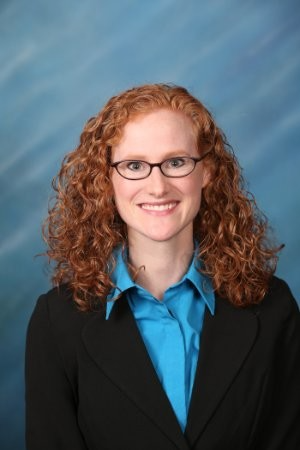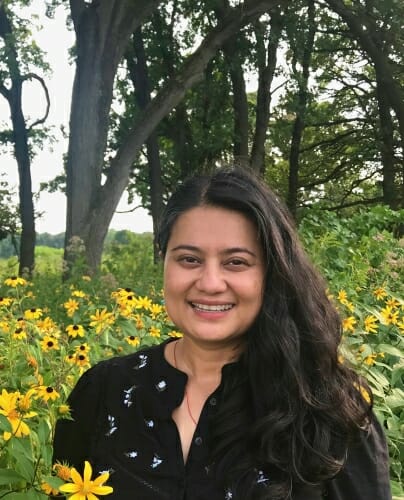Last May, when deaths from COVID-19 surpassed 100,000 in the United States, Omar Poler decided he needed to do something to acknowledge the immense loss.
He worried that, to many people, the death toll had become just a number — abstract and impersonal. He felt compelled, at least in his own life, not to let that happen.
Omar Poler Photo by Nicole Hansen
“I wanted to feel a connection to those who had died, to acknowledge their lives,” says Poler, the indigenous education coordinator for the Office of the Provost and the School of Education at UW–Madison.
By mid-summer, Poler had landed on an approach that was meaningful to him and that he hoped might resonate with others. Every Thursday morning at 10, he stops whatever he is doing and spends 10 minutes remembering — and honoring — the lives lost to COVID-19. Often, he will spend a few moments learning about the life of a stranger through a news story or an obituary.
“I look for what gave them joy, and I reflect on the impact they had on their families and their communities,” he says. “It’s about grief, but it’s also about gratitude.”
The weekly ritual has spread through word of mouth to other parts of campus and beyond. It remains a deeply individual practice — there is no structure or Zoom gathering — yet now many others are simultaneously participating in their own ways, giving it a communal aspect.

Julia Yates
“My first thought when I heard about this was simply, ‘This is powerful, this is needed,’” says Julia Yates, a psychotherapist and director of behavioral health for the UW Department of Family Medicine and Community Health. “A practice like this can be individually nurturing while also creating a shared energy. There’s something incredibly powerful in collective healing.”
Poler has taken to calling the ritual “Thursday Mournings.” If someone expresses interest, he emails them an invitation.
“Together, as we practice and reaffirm our humanity weekly, we refuse to become habituated to horror,” the invitation reads. “Through our collective and creative mourning, let’s share our respect for death and reverence for life.” (See full text below)
Yates, who is in charge of the behavioral health curriculum for family medicine residents, has circulated the invitation to residents in the program and posted about the ritual on FamWell, the department’s internal wellness and resilience website, which she oversees.
“Our residents need resiliency practices,” she says. “They need to know that pausing to grieve is not only allowed but encouraged. That’s a healthy and important message coming from our department.”
She participates herself, often using the weekly 10 minutes to journal about the pandemic. Others say they listen to music, meditate, or include their children in intergenerational activities.

Kathleen Nichols
Kathleen Nichols, a faculty associate in the elementary education program at the UW School of Education, learned about the ritual last summer while talking with Poler, a friend and colleague.
“I was experiencing a lot of loss in my personal life, while also feeling that, as a nation, we weren’t collectively thinking about each other in a humane way,” she says.
She believes a practice of this nature has the potential to unite people at a time when being physically together is not an option and many people feel socially isolated. She plans to share information about the ritual with the soon-to-be teachers she works with in elementary education.
“As we’re rushing through our days, this sort of moment allows us to feel connected to people and to focus on what’s meaningful to us — not just what we’ve lost, but what’s worth protecting and fighting for,” Nichols says.
Poler says he chose Thursday mornings at 10 because he wanted the day and time to be unexpected and disruptive, to break people from the “boxes” they typically put such activities in. The length — 10 minutes — also was deliberate.
“Mourning is challenging,” Poler says. “I wanted this to have an achievable entry point. Ten minutes is long enough to require intention, yet short enough to be inviting. Doing it weekly means we have a regular opportunity to practice –– to experiment, learn, share, and exercise our ability to mourn.”

Dekila Chungyalpa
The Center for Healthy Minds at UW–Madison supports Poler’s effort and is working to spread the word about it, says Dekila Chungyalpa, director of the center’s Loka Initiative. She is helping Poler develop a stand-alone website about the ritual.
“This is probably one of the most needed things we can have in our society,” she says. “As a country, we don’t know how to mourn. We’re told that death is failure, so we don’t know how to come to terms with loss. I would love to see this become a movement where we practice together our sense of humanity and compassion. It’s a beautiful vision.”
……………………….
Here is the invitation Omar Poler sends to those who wish to participate:
Thursday Mournings
Thursdays | 10 minutes | 10 a.m.
Every Thursday morning, we invite you to join us in mourning.
At 10 a.m., let’s take 10 minutes to remember — and honor – the lives lost due to COVID-19.
Together, as we practice and reaffirm our humanity weekly, we refuse to become habituated to horror.
Through our collective and creative mourning, let’s share our respect for death and reverence for life.
This is non-political, yet necessarily political.
#thursdaymournings
